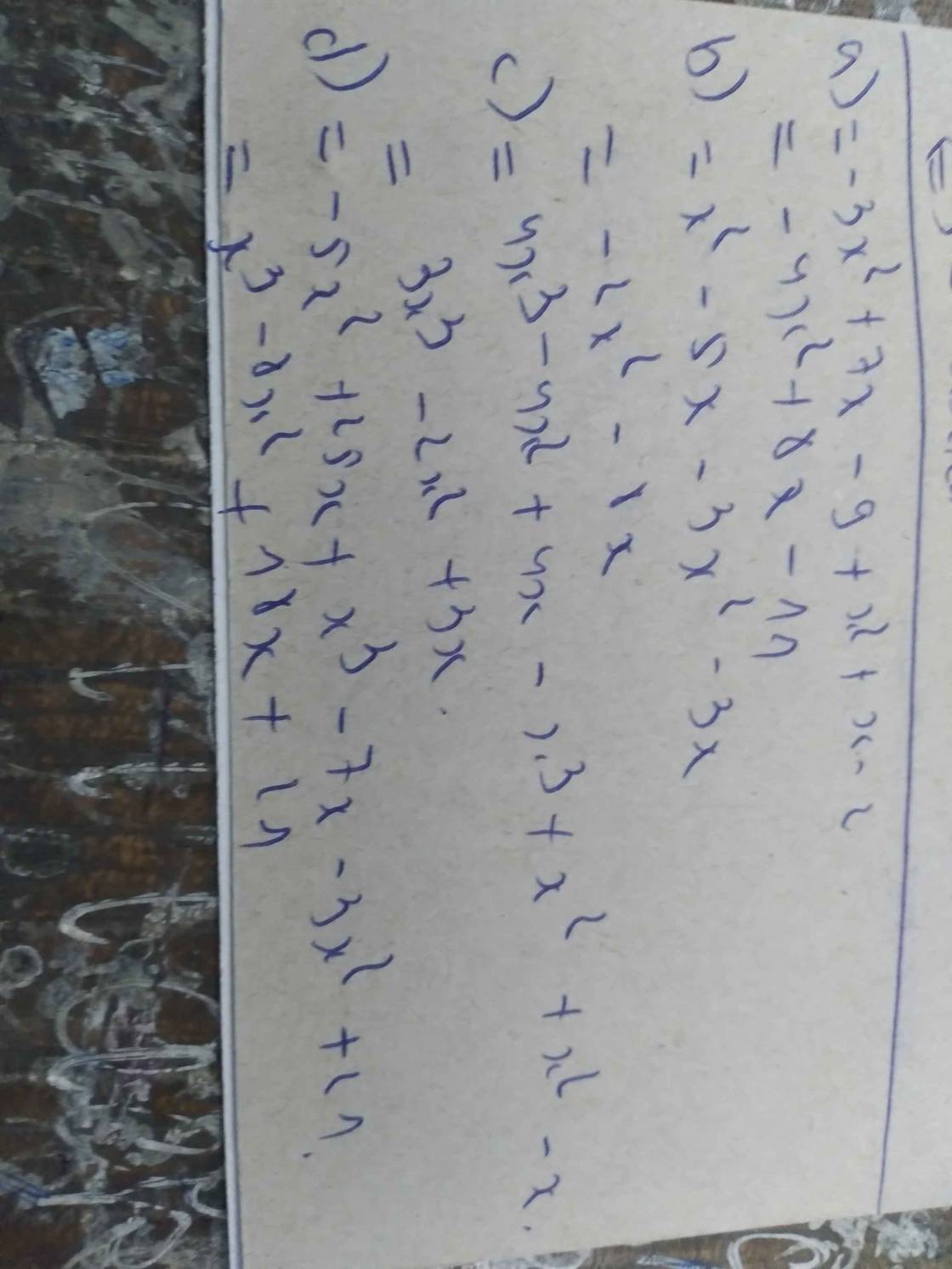Hãy nhập câu hỏi của bạn vào đây, nếu là tài khoản VIP, bạn sẽ được ưu tiên trả lời.

1 ) a) \(4x^2-x^2+8x^2\)
\(=\left(4+8\right).x^2+x^2-x^2\)
\(=12.x^3\)
b) \(\frac{1}{2}.x^2.y^2-\frac{3}{4}.x^2.y^2+x^2.y^2\)
\(\left(\frac{1}{2}-\frac{3}{4}\right).x^2.x^2.x^2.+y^2+y^2+y^2\)
\(=-\frac{1}{4}.x^6+y^6\)
c) \(3y-7y+4y-6y\)
\(=\left(3-7+4-6\right).y.y.y.y\)
\(=-6.y^4\)
2)
\(\left(-\frac{2}{3}.y^3\right)+3y^2-\frac{1}{2}.y^3-y^2\)
\(\left(-\frac{2}{3}+3-\frac{1}{2}\right).y^3.y^3-y\)
\(=\frac{25}{6}.y^5\)
b) \(5x^3-3x^2+x-x^3-4x^2-x\)
\(=\left(5-3-4\right).\left(x^3.x^2+x-x^3-x^2-x\right)\)
\(=-2.0=0\)
hông chắc
3)a) \(5xy^2.\frac{1}{2}x^2y^2x\)
\(\left(5.\frac{1}{2}\right).x^2.x^2.x.y^2.y^2\)
\(=\frac{5}{2}.x^5.y^4\)
b) Tổng các bậc của đơn thức là
5+4 = 9
Hệ số của đơn thức là \(\frac{5}{2}\)
Phần biến là x;y
Thay x=1;y=-1 vào đơn thức
\(\frac{5}{2}.1^5.\left(-1\right)^4\)
\(\frac{5}{2}.1.\left(-1\right)\)
\(\frac{5}{2}.\left(-1\right)=-\frac{5}{2}\)
Vậy ....
chắc không đúng đâu uwu

a) 3x(x + 2) + 4x(-2x + 3) + (2x - 3)(3x + 1)
= 3x2 + 6x - 8x2 + 12x + 6x2 + 2x - 9x - 3
= (3x2 - 8x2 + 6x2) + (6x + 12x + 2x - 9x) - 3
= x3 + 11x - 3
b) (x2 + 1)(x2 - x + 2) - (x2 - 1)(x2 + x - 2)
= x4 - x3 + 3x2 - x + 2 - x4 - x3 + 3x2 + x - 2
= (x4 - x4) + (-x3 - x3) + (3x2 + 3x2) + (-x + x) + (2 - 2)
= -2x3 + 6x2
c) (-2x - 3)2 + (3x + 2)2 + (4x + 1)
= 4x2 + 12x + 9 + 9x2 + 12x + 4 + 4x + 1
= (4x2 + 9x2) + (12x + 12x + 4x) + (9 + 4 + 1)
= 13x2 + 28x + 14

a, \(A=2x^2+x+6\)
Với x = 1 suy ra A = 2 + 1 + 6 = 9
Với x = 1/2 suy ra A = 1/2 + 1/2 + 6 = 7
b, \(B=7x-6y-5\)Thay x = 3 ; y = -2 ta được
B = 7.3 - 6 ( - 2 ) - 5 = 21 + 12 - 5 = 33 - 5 = 28

a) 2x(x+3) – 3x2(x+2) + x(3x2 + 4x – 6)
= (2x . x + 2x . 3) – (3x2 . x + 3x2 . 2) + (x . 3x2 + x . 4x – x . 6)
= 2x2 + 6x – (3x3 + 6x2) + (3x3 + 4x2 - 6x)
= 2x2 + 6x – 3x3 – 6x2 + 3x3 + 4x2 - 6x
= (– 3x3 + 3x3 ) + (2x2 - 6x2 + 4x2 ) + (6x – 6x)
= 0 + 0 + 0
= 0
b) 3x(2x2 – x) – 2x2(3x+1) + 5(x2 – 1)
= [3x . 2x2 + 3x . (-x)] – (2x2 . 3x + 2x2 . 1) + [5x2 + 5 . (-1)]
= 6x3 – 3x2 – (6x3 +2x2) + 5x2 – 5
= 6x3 – 3x2 – 6x3 - 2x2 + 5x2 – 5
= (6x3 – 6x3 ) + (-3x2 – 2x2 + 5x2) – 5
= 0 + 0 – 5
= - 5

a: P(x)=-x^3+2x^3-x^2+3x^2+x-1=x^3+2x^2+x-1
Q(x)=-3x^3+2x^3-x^2+3x-4x+3=-x^3-x^2-x+3
b: H(x)=P(x)+Q(X)
=x^3+2x^2+x-1-x^3-x^2-x+3
=x^2+2
c: H(-1)=H(1)=1+2=3
d: H(x)=x^2+2>=2>0 với mọi x
=>H(x) ko có nghiệm

\(a,-3x^2+7x-9+\left(x-1\right)\left(x+2\right)\\ =-3x^2+7x-9+x^2-x+2x-2\\ =\left(-3x^2+x^2\right)+\left(7x-x+2x\right)-\left(9+2\right)\\ =-2x^2+8x-11\\ b,x\left(x-5\right)-2x\left(x+1\right)\\ =x^2-5x-2x^2-2x\\ =\left(x^2-2x^2\right)-\left(5x+2x\right)\\ =-3x^2-7x\\ c,4x\left(x^2-x+1\right)-\left(x-1\right)\left(x^2-x\right)\\ =4x^3-4x^2+4x-x\left(x^2-x\right)+x^2-x\\ =4x^3-4x^2+4x-x^3+x^2+x^2-x\\ =\left(4x^3-x^3\right)+\left(-4x^2+x^2+x^2\right)+\left(4x-x\right)\\ =3x^3-2x^2+3x\\ =x\left(3x^2-2x+3\right)\)
\(d,-5x\left(x-5\right)+\left(x-3\right)\left(x^2-7\right)\\ =-5x^2+25x+x\left(x^2-7\right)-3\left(x^2-7\right)\\ =-5x^2+25x+x^3-7x-3x^2+21\\ =\left(-5x^2-3x^2\right)+\left(25x-7x\right)+x^3+21\\ =-8x^2+x^3+18x+21\)

Bài 3:
\(f\left(x\right)=9x^3-\frac{1}{3}x+3x^2-3x+\frac{1}{3}x^2-\frac{1}{9}x^3-3x^2-9x+27+3x\)
\(f\left(x\right)=\left(9x^3-\frac{1}{9}x^3\right)-\left(\frac{1}{3}x+3x+9x-3x\right)+\left(3x^2-3x^2\right)+27\)
\(f\left(x\right)=\frac{80}{9}x^3-\frac{28}{3}x+27\)
Thay x = 3 vào đa thức, ta có:
\(f\left(3\right)=\frac{80}{9}.3^3-\frac{28}{3}.3+27\)
\(f\left(3\right)=240-28+27=239\)
Vậy đa thức trên bằng 239 tại x = 3
Thay x = -3 vào đa thức. ta có:
\(f\left(-3\right)=\frac{80}{9}.\left(-3\right)^3-\frac{28}{3}.\left(-3\right)+27\)
\(f\left(-3\right)=-240+28+27=-185\)
Bài 4: \(f\left(x\right)=2x^6+3x^2+5x^3-2x^2+4x^4-x^3+1-4x^3-x^4\)
\(f\left(x\right)=2x^6+\left(3x^2-2x^2\right)+\left(5x^3-x^3-4x^3\right)+\left(4x^4-x^4\right)\)
\(f\left(x\right)=2x^6+x^2+3x^4\)
Thay x=1 vào đa thức, ta có:
\(f\left(1\right)=2.1^6+1^2+3.1^4=2+1+3=6\)
Đa thức trên bằng 6 tại x =1
Thay x = - 1 vào đa thức, ta có:
\(f\left(-1\right)=2.\left(-1\right)^6+\left(-1\right)^2+3.\left(-1\right)^4=2+1+3=6\)
Đa thức trên có nghiệm = 0
